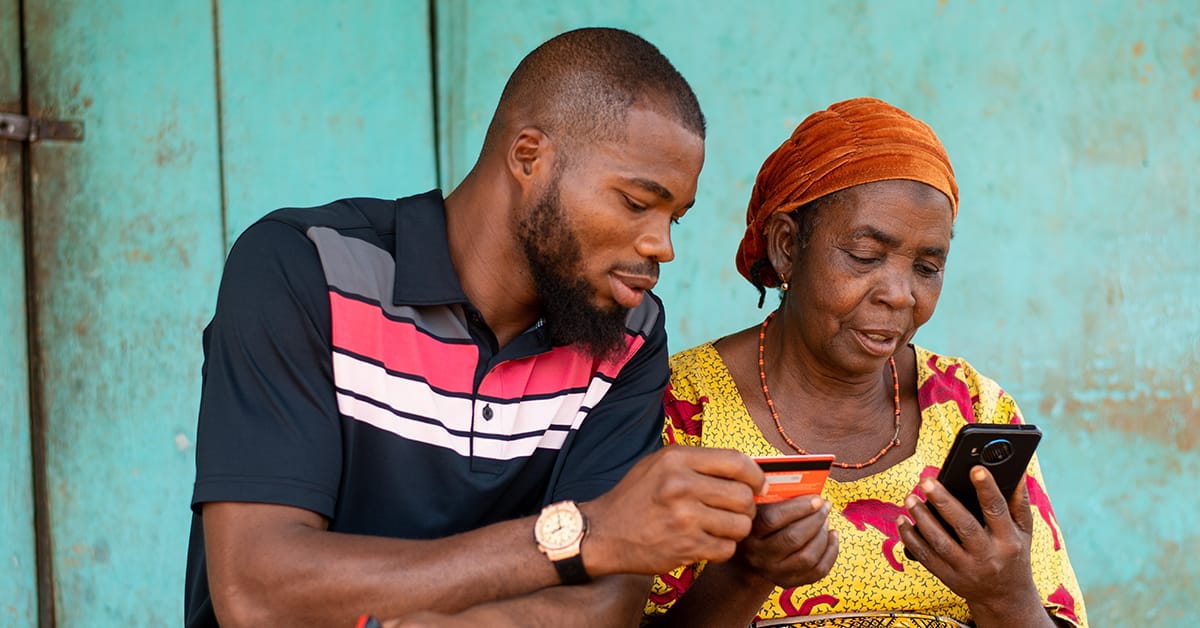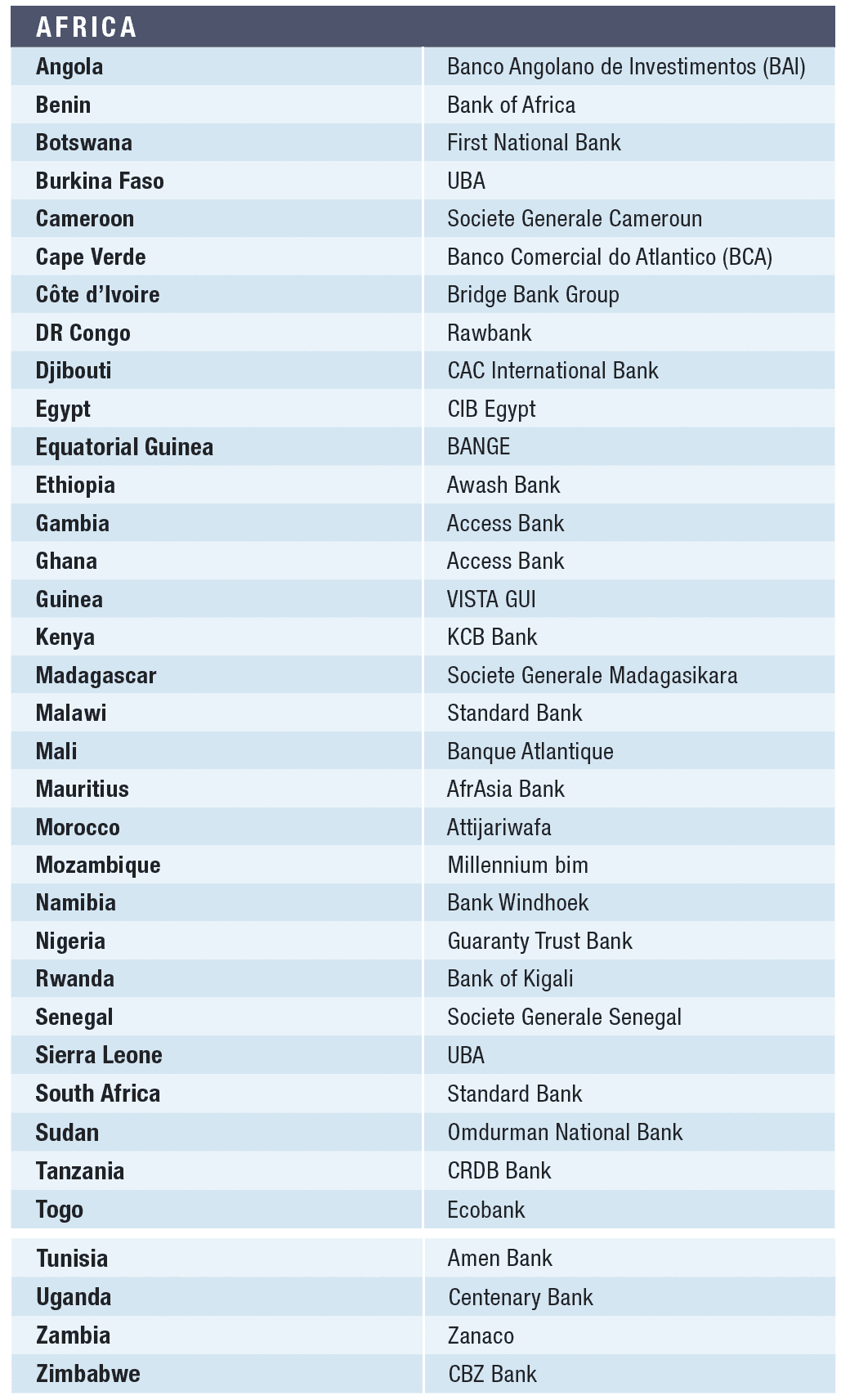African banks remain resilient and ready to weather any storm that comes their way.

In years gone by, Africa’s banks used to dread any signs of tremor in the global financial system. Times have changed. For the first time in history, banks in Africa remained largely unperturbed in March when most emerging markets were on tenterhooks for fear that a crisis boiling up in the advanced world could spread globally. Though not immune to global contagion, alarm bells did not sound in Africa.
“If a financial crisis came, we would weather it,” says James Mwangi, CEO of East Africa’s regional bank Equity Group. He adds that having come largely unscathed through the Covid-19 shock and the capping of interest rates in Kenya, there is a strong sense of confidence in the sector across the continent.
Africa’s banks have become quite resilient, after years of building robust Tier 1 capital baselines; consciously deciding to be conservative, unlike their Western counterparts; investments in technology and lately digitalization; and conforming to stricter regulatory scrutiny. The fact that today global tremors come secondary to domestic disruptors has made banks in Africa focus keenly on buttressing their guard rails with concrete as they pursue growth. With profits on a phenomenal rise, particularly among Tier 1 and Tier 2 banks, the effort to ensure continuous growth amid stiff competition is the new norm. This is fueling rapid digitalization to enhance the quality of products and services, drive financial inclusion and motivate widespread regional expansion.
Many banks on the continent, having built a solid base in their domestic markets, see expansion into new territories as necessary. Access Bank, for instance, Africa’s biggest bank by customer base with over 52 million, has a presence in 17 countries. Yet, the bank is still exploring more opportunities. “We are expanding into more markets in Africa and beyond and seek to dominate the retail and wholesale space,” says Olumide Olatunji, Access Bank Ghana’s managing director.
Kenya-based lender KCB Bank is another bank pursuing regional expansion. In December, the bank completed the acquisition of Trust Merchant Bank (TMB) in the Democratic Republic of Congo (DRC) in a deal reportedly valued at $113 million. This gave the bank a strong foothold in one of the fastest-growing markets in Africa. Before the deal, TMB boasted $1.5 billion in assets, 110 branches and over 3.2 million customers. According to KCB Group CEO Paul Russo, regional investments are vital in accelerating future growth. “The entry into DRC continues to reinforce our market capabilities,” he states.
By all indications, Africa’s banks are more bullish than ever. A clear sign is the record profits being announced by banks in Africa’s five biggest banking markets: Egypt, Kenya, Morocco, Nigeria and South Africa. In Kenya, for instance, the nine banks listed on the Nairobi Securities Exchange cumulatively posted $1.3 billion in net profits last year, a 25% increase from $1 billion in 2021.
Standard Bank Malawi is among the banks that are quite excited about the future. Through innovations, including artificial intelligence and big data analytics, that bank is creating solutions to help accelerate and catalyze the aspirations of its customers and the country at large. “We see a future where customers enjoy personalized, convenient and exceptional service,” says Phillip Madinga, Standard Bank Malawi CEO.
Despite the overriding bliss, caution remains. Macroeconomic upheavals in most countries, including high inflation, monetary tightening, currency depreciation, dwindling reserves, sovereign debt servicing constraints and slowing growth—coupled with rising political risks—mean a cloud of uncertainty continues to hover over banks.
In the prevailing environment, Global Finance’s World’s Best Banks in Africa for 2023 has cogently rewarded not only trailblazers but also nimble and aggressive banks disrupting the status quo in different markets and emerging as major forces. The awards recognize that while being at the top is easy, it is a Herculean task to remain on top.
Regional Standout
The Bank of Africa (BOA) is Africa’s overall Best Bank. For the Morocco-based Pan-African lender, emergence as Africa’s best bank has been in the making. However, it has not been an easy journey. The bank is present in 20 countries in Africa and boasts 531 branches. Globally, it operates in 32 countries across Africa, Europe, Asia and North America, with 2,000 branches and 6.6 million customers.
The African market has been a mixed bag of fortunes for BOA in recent years. It operates in some of the fastest-growing banking markets, like the DRC, Ethiopia and Senegal. But on the other hand, it is present in some of the most volatile markets, particularly in West Africa. Moreover, in two of its subsidiaries, Burkina Faso and Mali, coups d’état have adversely impacted operations in recent years.
These challenges, including the economic crisis in Ghana, have kept BOA from building a strategy that returns growth across all parameters. The banking group’s 2022 consolidated financial results show that gross operating income showed an 18.7% increase to $353 million from $297.3 million in 2021. With total assets rising by 9.3% to $11 billion, the bank saw its return on equity (ROE) hit 18.9%.
BOA has been quite apprehensive that the political turmoil in West Africa could have a contagious effect across all its regional markets; but luckily, it has largely evaded that bullet. This is evident in Benin, where the bank has maintained its tight grip on the market after emerging as Best Bank for the third consecutive year.
In Benin, the bank continues to project resilience amid rising competition. It closed 2022 with $1.5 billion in assets and 17.8% in ROE. Having built a niche in the small and midsize enterprise (SME) market and trade finance, the bank has identified the agricultural sector as key to future growth. The sector accounts for about 30% of the country’s GDP.
Multicountry Winner
Africa is proving to be a difficult market for multinational banks, with exits and downscaling of operations being quite conspicuous. However, the case differs for Societe Generale, a multinational that remains steadfast in Africa with the opportunities the continent offers. “Africa is and remains a profitable growth driver for us,” says Laurent Goutard, head of International Retail Banking for Africa, the Mediterranean basin and overseas.
Belief in Africa, a market in which Societe Generale prides itself on four million customers, has given the bank the impetus to continue implementing strategies designed to cement dominance in key markets, particularly in West Africa, while pursuing market share growth across all the 19 countries where it operates.
Digital transformation and innovations form integral strategic components. For instance, the bank’s app, SG Connect, is a multibank, multilanguage and multicurrency solution connecting 11 countries. “We have the right range to reach and serve our diversified clients almost everywhere in Africa,” adds Goutard.
Having no qualms over its growth prospects in Africa, Societe Generale has been named our Best Bank in Cameroon, Madagascar and Senegal.
In Cameroon, where it has maintained its status for the fifth year running, Societe Generale Cameroun. Having entered Cameroon soon after independence, the bank has been instrumental in the country’s socioeconomic transformation journey in line with its “Grow with Africa” initiative.
Apart from securing its place in the annals of history, the bank’s market command is unrivaled. Overall, it controls a 16% market share. Regarding loans, which stood at $1 billion last year, its market share is 20.4% and 12.2% on deposits. Last year, the bank posted a 45% increase in profits to $37.1 million, with ROE of 20.4%.
In Madagascar, Societe Generale is not only cementing its market dominance but also continuing to record growth across all categories. In 2022, the bank saw its balance sheet hit the $1 billion mark, with ROE surging to 48% from 41% in 2021. In addition, the bank is opening more branches targeting the SME market.
Senegal is another market where Societe Generale is proving its mettle. Despite competition from Pan-African giants, the bank has positioned itself as a major partner in sustainable economic development. In particular, the bank is a leader in arranging syndicated and structured facilities for investors undertaking massive projects in sectors like oil and gas, mining and renewable energy.
West Africa
Concerns over worsening political instability and rising insecurity could erase economic gains in West Africa. Although, according to Moody’s, the outlook for the banking sector in Nigeria and the West African Economic and Monetary Union remains “stable,” banks are feeling the impacts in countries where the twin risks are elevated. A case in point is Burkina Faso, where two coups, in January and September last year, badly affected operations and bottom lines.
The coup turmoil has not spared UBA (United Bank for Africa), Global Finance’s Best Bank in Burkina Faso. The bank, however, has devised strategies to circumvent the challenges by deploying robust digital platforms and innovations like contactless payment services. This way, it has averted widespread disruptions.
UBA also takes the crown in Sierra Leone. The bank is leveraging transaction banking channels, digital products, trade and foreign exchange offerings to grow earnings, while executing a plan to mobilize deposits.
In Cape Verde, Banco Comercial do Atlantico (BCA) is cementing its dominant market control. With 34 branches commanding about a third of the loans and deposits market share, the bank posted $13.5 million in profits last year.
Bridge Bank Group, our third-time winner in Côte d’Ivoire, is indisputably the preferred partner for SMEs and a big supporter of women’s enterprises. With $1.3 billion in assets, the bank is plotting market capture in other segments and has rolled out a regional expansion strategy.
The winner in Equatorial Guinea is BANGE (Banco Nacional de Guinea Ecuatorial). Although the government owns the majority at 51%, the bank is a market leader in branch network and customer numbers. Though instability and considerable exposure to the public sector has impacted performance, financial inclusion and expansion are core to growth.
Access Bank, the Best Bank in Gambia, has positioned itself as the preferred partner in money transfers, cross-border payments and remittances. For the bank, sustainability and green finance are central to future growth.
In Ghana, our winner is also Access Bank. The worst economic crisis in years is shaking the resilience of banks, but Access Bank has strong shock absorbers. “Our customers should continue trusting us to deliver superior service, because we are here for the long haul,” says managing director Olatunji. With $861.3 million in assets, $38.7 million in profits and 44% in ROE, the bank is riding on digitalization to serve customers effectively.
After the controversial election in Guinea led to a period of instability and a military coup in 2021, VISTA GUI, the country’s Best Bank, expects to play a significant role in rebuilding the economy. Being one of the largest in financing the economy, the bank is upbeat. It has already secured $10 million from French development-aid group Proparco to enhance trade finance solutions.
This year again, Banque Atlantique is our Best Bank in Mali. In February 2022, the bank appointed Moussa Touré as managing director to oversee the next growth phase and ensure that the bank recovers from the impacts of international economic sanctions imposed on the country’s military government in December 2021 for delaying a return to civilian rule after the coup that put the military in power. The sanctions were lifted in July.
Guaranty Trust Bank is the winner in Nigeria, where banks grapple with customer anger due to a cash crunch occasioned by currency redesign. With $12.1 billion in assets, the bank is executing an African expansion strategy to double its customer base from 24 million to 50 million over the next five years.
Ecobank, the Best Bank in Togo, has a new group CEO. Jeremy Awori has the task of revitalizing the bank in Togo, hoping to close the $1 billion mark in assets in Togo.
Southern Africa
Angola sees Banco Angolano de Investimentos (BAI) tighten its grip as Best Bank. Big in the international card business, with a 62% market share, BAI seeks to expand corporate and premium banking while remaining committed to support for lower-income customers.
First National Bank is the winner in Botswana. Having realized a 25.7% ROE last year, the bank controls the market regarding assets and customer numbers. Retail clients account for 41% of its business.
Standard Bank, the Best Bank in Malawi, controls a 23.6% market share in deposits and 23.1% in loans. The bank is implementing a growth strategy based on three pillars—agriculture commercialization, urbanization and industrialization—to cement its market leadership. “We work to make the dreams of our customers and our nation come true,” avers CEO Madinga.
The South African winner also, Standard Bank Group continues to break records. Africa’s biggest lender in assets delivered record headline earnings growth of 26% in South Africa and a ROE of 15.2%, compared to 12.5% in 2021.
Once again, AfrAsia Bank is Global Finance’s Best Bank in Mauritius. Positioning itself as a local-global bank, AfrAsia continues to grow, with its balance sheet rising to $4.3 billion from $4.2 billion the previous year and profits increasing to $29.3 million from $20 million.
In Mozambique, Millennium bim is again the winner. Majority-owned by the BCP Group and posting $110 million in net income, the bank boasts a firm grip on the retail and SME market segments.
Bank Windhoek carries the crown in Namibia. With $3.8 billion in assets, the bank has floated its first ever $15 million sustainability bond in line with its commitments to provide unique financial solutions for green and sustainable initiatives.
In Zambia, Zanaco is the winner for the fourth consecutive year. With a strong command of the retail market, the bank has unleashed a $300 million dedicated facility to fund SMEs and corporates.
The Best Bank in Zimbabwe, CBZ Bank, commands the market regarding assets, loans and deposits. The bank has committed to investing 2% of its income in green projects.
North Africa
BEA (Banque Exterieure d’Algerie), which boasts $23.8 billion in assets and $519 million in profits, is our winner as Best Bank in Algeria. With 44 branches, the bank is building partnerships with fintechs to grow the market.
The winner in Egypt is CIB Egypt, the leading private-sector bank with $16.9 billion in assets, $204.5 million in profits and 23.1% ROE. Keen on environmental, social and governance strategy, CIB continues its green financing, which it started with Egypt’s first private sector green bond in 2021.
Attijariwafa’s dominance in Morocco remains mainly unshaken. With 10.8 million customers, the bank has adopted a universal banking model and is executing an aggressive expansion strategy into new markets.
For the second year, Omdurman National Bank is the winner in Sudan. Despite prolonged and sometimes violent political turmoil, the bank, which offers Shariah-compliant Islamic banking, posted $37 million in net profits with an ROE of 38%.
Amen Bank is Global Finance’s Best Bank in Tunisia for the fourth year. The lender plans to boost core capital to $56 million and implement its “NEXT” transformation strategy to push growth. Apart from seeking to expand digital offerings, Amen is also investing in a robust core banking system.
East Africa
The winner in Djibouti, for the fifth time, is CAC International Bank. The bank, prominent in Islamic banking, launched an e-bank service designed for high-net-worth individuals and is also opening new branches to grow the retail segment.
The Best Bank in Ethiopia, Awash Bank, boasting $3.9 billion in assets and $137 million in profits, is implementing a “Grand Strategy” to catapult it to become one of East Africa’s top 10 banks.
In Kenya, our winner is KCB Bank. With a 19.5% rise in 2022 to $314.5 million after-tax profit, digital channels now define its business with 98% of transactions outside physical branches. The bank is also transitioning all its activities to net-zero by 2050. “We are pursuing a sustainability agenda anchored on doing well amidst the harsh economic environments,” notes Group CEO Russo.
The Bank of Kigali (BOK) is Rwanda’s Best Bank for the third year running. With competition increasing from foreign banks, BOK is determined to maintain leadership with investments in the core banking system and expansion of its digital footprint. It also launched Alipay, one of the cheapest money transfer services in the country.
Global Finance’s winner in Tanzania is CRDB Bank, for the fourth time in a row. With $149.6 million in profits and 26% ROE, the bank is rolling out a regional expansion strategy—the first outside market being the DRC.
Centenary Bank took the title again in Uganda. Owned by the Catholic and Episcopal churches, the bank has cut an unrivaled niche in financing the agricultural sector and the rural economy, focusing on women.
Central Africa
The winner in the DRC is Rawbank. With $4.5 billion in assets, the bank controls a 30% market share and aggressively pushes to increase lending, aiming to hit $1 billion in loans, up from $820 million.




